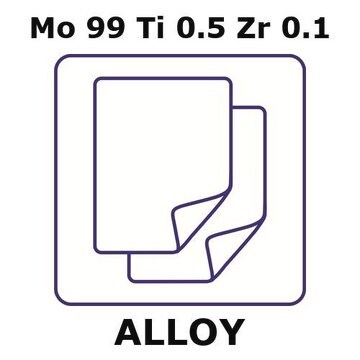266922
Molybdenum
foil, thickness 0.1 mm, ≥99.9% trace metals basis
Sinónimos:
Molybdenum element
About This Item
Productos recomendados
Quality Level
assay
≥99.9% trace metals basis
form
foil
resistivity
5.0 μΩ-cm, 20°C
thickness
0.1 mm
bp
4612 °C (lit.)
mp
2617 °C (lit.)
density
10.3 g/mL at 25 °C (lit.)
SMILES string
[Mo]
InChI
1S/Mo
InChI key
ZOKXTWBITQBERF-UHFFFAOYSA-N
Categorías relacionadas
General description
Quantity
Storage Class
13 - Non Combustible Solids
wgk_germany
nwg
flash_point_f
Not applicable
flash_point_c
Not applicable
ppe
Eyeshields, Gloves, type P3 (EN 143) respirator cartridges
Elija entre una de las versiones más recientes:
¿Ya tiene este producto?
Encuentre la documentación para los productos que ha comprado recientemente en la Biblioteca de documentos.
Los clientes también vieron
Artículos
Biomedical implants are essentially foreign substances within the human body that must survive many years’ exposure to demanding mechanical and physiological conditions. Despite these challenges, metal implants have been widely used to substitute for or rebuild hard tissues such as bones and teeth.
Nuestro equipo de científicos tiene experiencia en todas las áreas de investigación: Ciencias de la vida, Ciencia de los materiales, Síntesis química, Cromatografía, Analítica y muchas otras.
Póngase en contacto con el Servicio técnico



